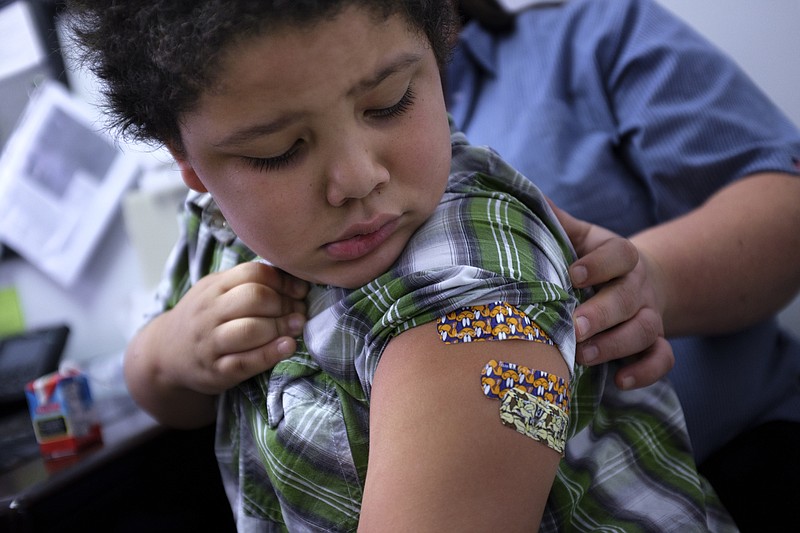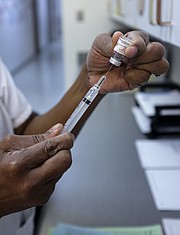It's no shots, no school.
Students need more than a backpack and sharpened pencils to be prepared to enter Hamilton County classrooms this year - they need up-to-date immunization records too.
"It's no shots, no school," said Sheryl Rogers, health services coordinator for Hamilton County Department of Education.
The health departments in Tennessee and Georgia say the rate of childhood immunizations has been unaffected this year by the national debate that erupted after a measles outbreak was traced back to Disneyland earlier this year. Unvaccinated children are believed to be among those responsible for the 180-person, 18-state measles outbreak, which placed many anti-vaccination advocates on the defense.
Required vaccinations for Tennessee students
Children enrolling in kindergartenHepatitis B (HBV)Diphtheria-Tetanus-Pertussis (DTaP, or DT if appropriate)Poliomyelitis (IPV or OPV) — final dose on or after the 4th birthdayMeasles, Mumps, Rubella — 2 doses of each, usually given together as MMRVaricella — 2 doses or credible history of diseaseHepatitis A — total of 2 doses, spaced at least 6 - 18 months apartAll children entering 7th grade (including those currently enrolled)Tetanus — diphtheria-pertussis booster (Tdap) - evidence of one Tdap dose given any time before 7th grade entry is required regardless of Td historyVaricella — 2 doses or credible history of diseaseNew enrollees in grades other than kindergartenHepatitis B (HBV)Diphtheria-Tetanus-Pertussis (DTaP, or DT if appropriate)Poliomyelitis (IPV or OPV - final dose on or after the 4th birthdayMeasles, Mumps, Rubella — 2 doses of each, normally given together as MMRVaricella — 2 doses or credible history of diseaseNew students entering grades other than 7th grade Not required to have TdapSource: Tennessee Department of Health
Here in Tennessee and Georgia, students are required to have a list of vaccinations before entering kindergarten or transferring into a school district, unless they provide a valid medical or religious waiver to the school.
Last school year only 46 of the 3,545 kindergartners requested a religious exemption in Hamilton County, and two required a medical exemption. This high immunization rate is on-track with the state's. For the past several years the vaccination rate among children has been about 95 percent, according to the Tennessee Department of Health.
Rogers says she expects Hamilton County's high rate of childhood immunizations to continue, but added that you never know what will happen until students show up on the first day of school.
Nancy Nydam, spokeswoman for the Georgia Health Department, said most students attending Georgia public schools are being vaccinated, and very few parents are seeking exemptions for their kids.
"We haven't had much push-back with immunizations in the last several years," Nydam said. " All the media attention [regarding the immunization debate] actually brought a short-lived positive response, and more kids were being vaccinated."
A majority of doctors say the myth about vaccinations leading to autism is debunked, calling it a fad, and saying medical research largely supports the positive affects of vaccinations. In the Chattanooga area the majority of pediatricians will not accept patients if they are not vaccinated.
Alicia Whitley, manager of the pediatric clinic at the Chattanooga-Hamilton County Health Department, said she has noticed that parents are less afraid to have their children vaccinated than years ago, because the science proving the benefits is so widespread.
But Barbara Fisher, president of the National Vaccine Information Center, said parents should not be told whether or not they need to vaccinate their kids.
The center advocates for increased exemptions, believing it is important for parents to have the right and ability to choose whether their children are vaccinated.
"These vaccines do carry the risk of injury and death," Fisher said, " and science has not defined who is or who is not at risk from the vaccinations."
Fisher believes the current medical exemptions in Tennessee and Georgia are too narrow, and leave out numerous conditions and reasons that a child shouldn't be vaccinated. She said every state should offer a philosophical or conscientious exemption so parents can decide what is best for their children.
Officials with the Chattanooga-Hamilton County Health Department say they are pleased with the state's high vaccination rate, and believe it is one of the factors protecting the region from a communicable disease outbreak.
Connie Buecker, communicable disease program manager at the health department, said it is important that everyone who can be vaccinated is, because it's a way of protecting those who cannot receive the shots for medical reasons.
"A little pain today can save kids from so much pain down the road," Buecker said. " The hurt from the shot for most kids lasts a few moments and it's so much better than getting the disease."
Contact staff writer Kendi Anderson at kendi.anderson@timesfree press.com or 423-757-6592.

